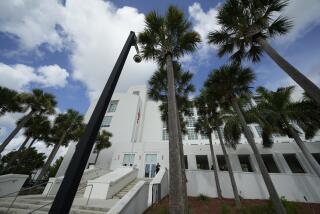Showdown Over Miller Mormon Issue Fizzles
An expected courtroom showdown over the question of alleged Mormon favoritism fizzled Thursday when defense lawyers passed up a chance to ask the head of the FBI’s Los Angeles office if he had ever given special treatment to Richard W. Miller.
Richard T. Bretzing was recalled as a defense witness by Miller’s lawyers after U.S. District Judge David V. Kenyon had given them permission to question him about his alleged coddling of Miller, as well as his motives for a stern religious lecture just before Miller’s arrest Oct. 2, 1984, on espionage charges.
Related Allegations
However, Kenyon, himself, blocked Joel Levine and Stanley Greenberg from directly linking the Mormon religion to Bretzing’s treatment of Miller, and the ex-agent’s lawyers decided not to pursue related allegations they have made that Miller was first protected and then treated with undue harshness by Bretzing.
Bretzing is a Mormon bishop, and Miller was a member of the Mormon Church until his excommunication in early 1984 for adultery. P. Bryce Christensen, formerly Miller’s supervisor on the Soviet counterintelligence squad and now an assistant agent in charge of the Los Angeles office, is also a Mormon.
Instead of the expected testimony about his past treatment of Miller, Bretzing’s courtroom appearance was restricted to an explanation of his motives for urging Miller on Sept. 29, 1984, to consider the “spiritual ramifications” of his alleged espionage activity and to give the FBI a full confession of any harm that he had done to U.S. security.
Bretzing had testified last Sept. 6 that his reason for giving the controversial speech urging Miller to confess his “wrongdoing” was his fear that the ex-agent had access to “extremely sensitive information” that could have threatened U.S. security.
However, Miller’s defense team was provided Thursday with partial transcripts of a U.S. Equal Employment Opportunity Commission hearing last January in which Bretzing said Miller had been assigned to menial work within the FBI’s Soviet counterintelligence unit. The defense lawyers contended that this contradicted Bretzing’s trial testimony.
On the stand Thursday, Bretzing denied that there was any contradiction. He said that while Miller was assigned to “very mundane” duties in counterintelligence, he still had access to sensitive classified documents.
Bretzing was among the final witnesses in the Miller trial, as Miller’s lawyers prepared to finish their defense of the first FBI agent ever charged with espionage.
Levine and Greenberg said they will reveal today if Miller will be called to testify in his own behalf as the last defense witness. If not, they said, they have already finished presenting their case and are prepared for closing statements next week.
Joining Bretzing and two other FBI agents, John S. Bradford and Gary Auer, as witnesses Thursday was Bernardo (Matt) Perez, a former top aide to Bretzing in the Los Angeles office, who was reassigned last year to the FBI’s El Paso office.
Perez repeated to the jury testimony that he had given outside the jury’s presence Wednesday, in which he said he had urged Bretzing to consider firing Miller in 1982, because Miller was overweight and was performing poorly. Perez said Bretzing had told him to let Christensen handle the problem.
Outside the jury’s presence, Perez, a Roman Catholic who had filed the Equal Employment Opportunity Commission complaint charging Bretzing with religious discrimination, had tied that allegation to charges that Bretzing and Christensen were giving Miller special treatment as an agent, because of their shared Mormon religious backgrounds.
Thursday, however, the Mormon issue was not raised. Kenyon cut off Greenberg when he asked Perez if he knew that Bretzing was a Mormon bishop and that Christensen was also a Mormon. Miller’s lawyers, blocked by a gag order from explaining their reasons, also chose not to ask Bretzing if he had given special treatment to Miller for any other reason.
“I recommended that consideration be given to firing Mr. Miller,” Perez said under direct examination by Greenberg. “I told him if Mr. Miller could not lose weight after repeated warnings, we ought to look into getting him a medical disability retirement. If he could lose weight, we should consider firing him for insubordination.
“I spoke to Mr. Bretzing about Mr. Miller’s past work record,” Perez continued. “I said he was a bumbler who should not be an FBI agent. My concern was we are not a social welfare agency, and we should not keep a man on just because he had been there a long time. He told me the matter should be handled by Mr. Christensen, to give it to him.”
On cross-examination, U.S. Atty. Robert C. Bonner asked Perez if he had recommended that Miller be fired on the spot.
“No sir, I did not,” Perez said. “I was recommending that consideration be given to getting rid of him.”
Bretzing, in his Sept. 6 testimony, had denied that Perez ever proposed that Miller be fired, but Miller’s lawyers did not directly challenge him on the discrepancy between the two witnesses.
Bonner also challenged defense claims that Bretzing had protected Miller, noting that Miller was assigned to the counterintelligence squad by non-Mormon agents before Bretzing arrived in Los Angeles in 1982. He said Bretzing had disciplined Miller more severely than any previous Los Angeles FBI official.
More to Read
Sign up for Essential California
The most important California stories and recommendations in your inbox every morning.
You may occasionally receive promotional content from the Los Angeles Times.









